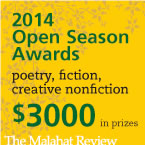
Deadline: November 1, 2013 (postmarked)
Prize: $1000 CAD in each of three categories
Entry fee:
$35 CAD for Canadian entries
$40 USD for entries from the USA
$45 USD for entries from elsewhere
(entry fee includes a one-year subscription to The Malahat Review)
Enter up to three poems (1oo lines each max.); one piece of short fiction (2500 words max.); OR one piece of creative nonfiction
(2500 words max.)
Read full guidelines on our website.

In the Direction of the Unforeseen: PJ Grace in Conversation with Lisa Martin-DeMoor, winner of the 2013 Open Season Award for Poetry
PG: One year after winning The Malahat Review’s 2013 Open Season Award for Poetry, in what direction has your life taken you?
LMD: In the direction of the unforeseen. I'm back to teaching literature to university students for the first time since 2007. My daughter has just started kindergarten, and my two-year-old son is busy discovering that words can be combined into declarations (also interrogations and exclamations) about himself and many other things. How to Expect What You're Not Expecting: Stories of Pregnancy, Parenthood, and Loss (the anthology I co-edited with Jessica Hiemstra) has just been released by Touchwood Editions. I'm working on a novel that deals with some of the same material (thematically) as “Believing is not the same as Being Saved,” the poem that won the Open Season Award. I'm blogging less frequently (at www.writerinresidence.ca). I'm still figuring out life as a person who is a mother and a writer—while standing, as we all do, on shifting ground.
Read the rest of Lisa's interview on our website.

The Landscape of Fiction: Stephanie Harrington in Conversation with Carmelinda Scian, winner of the 2013 Open Season Award for Fiction
SH: Judge Helen Humphreys had high praise for your winning entry last year, “The Butterfly First,” calling it a “poignant and memorable account of a young girl's encounter with the tragedy and hypocrisy of the adult world." How has winning this award affected your life and writing career?
CS: The prize has given me the confidence to seriously pursue my writing; it is an affirmation that what I have to say has some merit. Winning carried a double message for me: one, that others were interested in learning how a young girl processes the fear, pain, brutality, and hypocrisy she witnesses around her, prevalent in the dictatorship of Salazar. Secondly, that a highly successful author like Helen Humphreys and the much coveted Malahat Review found it so, was a most significant endorsement of my endeavours.
Read the rest of Carmelinda's interview on our website.

The Past Becomes Story: Karen Bannister in Conversation with Susan Buis, winner of the 2013 Open Season Award for Creative Nonfiction
KB: Your training as a poet has impacted your prose writing, and I can sense this when reading this story. In what ways might you say the reverse is true?
SB: Writing prose helps me combat the tendency to wordiness in my poetry, but one of the most effective and unexpected writing lessons came when I was assigned to teach business and technical writing—which I had no training in at all. So I read a few textbooks, stayed a few steps ahead of the students, and the lessons really improved the grammar and concision of my own writing, although for creative writing, the technical voice has to be reined in.
Read the rest of Susan's interview on our website.